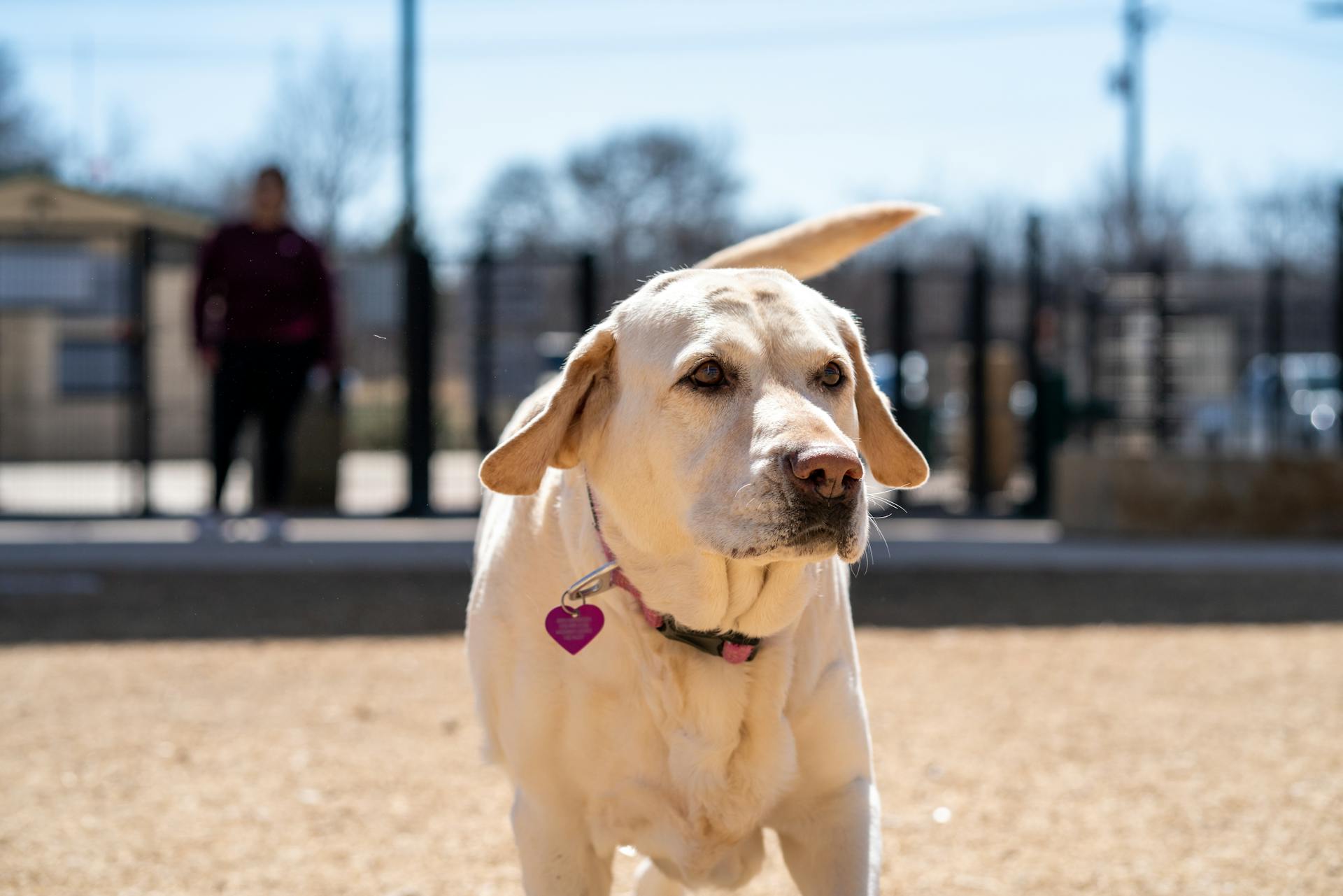
To qualify as an assistance animal, it must be prescribed by a licensed healthcare professional.
The Fair Housing Act requires landlords to make reasonable accommodations for assistance animals in housing, but they are not required to provide a specific type of housing or modifications.
Assistance animals can be dogs, cats, or other animals, but they must be under the control of the individual they assist.
Assistance Animal Laws
Assistance animal laws vary, but the Fair Housing Act applies to many types of housing, including public and privately owned housing. This act is administered by the U.S. Department of Housing and Urban Development.
The Fair Housing Act has specific rules for residents or applicants with disabilities who use service animals or other animals to assist with their disability. These rules may differ from other laws that apply.
State and local laws also play a role in assistance animal laws. Some states and local governments require service dogs to be licensed and vaccinated, just like all dogs. Others offer voluntary service dog registration programs.
Federal Laws
Federal laws play a crucial role in determining the rights and responsibilities of individuals with disabilities and their assistance animals. The Americans with Disabilities Act (ADA) is a key federal law that provides protections for individuals with disabilities, including those with service animals.
Under the ADA, service animals can be dogs or miniature horses that are individually trained to do work or perform tasks for the benefit of an individual with a disability. Service animals can be professionally trained or trained by the handler themselves.
The ADA does not require service animal handlers to provide certification for their service animals. However, in some cases, employers may request professional written verification when it is not obvious that the animal is a service animal.
The Fair Housing Act (FHA) also plays a significant role in protecting the rights of individuals with disabilities and their assistance animals. Under the FHA, housing entities must admit any type of "assistance animal", which includes service animals, comfort animals, or emotional support animals.
If this caught your attention, see: Peter Singer Animal Liberation Summary
The FHA does not require animals to be trained or in training to serve as an assistance animal. Housing entities may require limited documentation to verify a disability and need for an assistance animal, but this is only allowed if the disability and need are not already known or readily apparent.
Here are some key differences between the ADA and the FHA:
- The ADA defines service animals as dogs (or miniature horses) that are individually trained to do work or perform tasks for the benefit of an individual with a disability.
- The FHA defines assistance animals as any type of animal that helps a person with a disability, whether the animal performs active work or passively provides emotional support or comfort.
It's worth noting that the Air Carrier Access Act (ACAA) also provides protections for individuals with disabilities and their assistance animals. Under the ACAA, airlines are required to allow individuals with disabilities to be accompanied by animals that have been trained to perform tasks, as well as untrained animals, including emotional support animals.
Employment and Public Accommodation
In employment settings, the Americans with Disabilities Act (ADA) is administered by the Equal Employment Opportunity Commission (EEOC). This means that employers must consider requests for reasonable accommodations, including the use of service animals in the workplace.
An animal used as a reasonable accommodation in employment does not have to be a specific type of animal or perform a specific task, but it must be needed by the individual for a disability-related reason. Employers can request documentation from qualified professionals to verify an individual's disability and need for accommodation if it's not already known or obvious.
The EEOC's regulations don't define service animals, but they're considered examples of "reasonable accommodations" or "mitigating measures" that help address the limitations caused by disabilities. Employers can ask the same questions they would for any other type of accommodation: Does the individual have a disability? Is the animal needed because of the disability? Will allowing the animal in the workplace be reasonable or create an undue hardship?
Where Can Go
Service animals are allowed to accompany their handlers in various public places, including restaurants, shops, hospitals, schools, and hotels. This means that business owners and managers cannot require service animal handlers to dine outside or leave their dogs behind.
A service dog can go into a restaurant, but the business cannot require the handler to sit outside. For example, a woman with a service dog can ask to sit inside a restaurant, and the business cannot deny her request.
Service animals are also allowed in shops, hospitals, schools, and hotels. However, it's essential to note that service animals must be well-behaved and under the handler's control at all times.
Here are some examples of places where service animals are allowed:
- Restaurants
- Shops
- Hospitals
- Schools
- Hotels
It's worth noting that service animals can be kept out of certain areas if their presence would fundamentally alter the nature of the goods, services, programs, or activities provided to the public. However, this is relatively rare and usually only applies to specific situations, such as operating rooms or burn units.
ADA Title II & III
Under ADA Title II and III, a service animal must be a dog (or miniature horse) that is individually trained to do work or perform tasks for the benefit of an individual with a disability.
Service animals can be professionally trained or trained by the handler themselves, and a service animal handler does not need to provide certification for their service animal.
A comfort or emotional support animal is not trained and does not have rights under the ADA. Businesses do not have the legal obligation to admit a comfort animal if there is a "no pets" policy.
Here are the key differences between service animals and comfort animals under ADA Title II and III:
- Service animals are trained to perform tasks for individuals with disabilities, while comfort animals are not.
- Service animals have rights under the ADA, while comfort animals do not.
- Businesses must admit service animals, but not comfort animals, under a "no pets" policy.
Under Title II and III, it's not necessary to provide certification for a service animal, but employers may request professional written verification when it's not obvious that the animal is a service animal.
Requesting Animal Removal
If a service animal is not housebroken, a business or state/local government can ask the person to remove it.
This is not a personal preference, but rather a legitimate reason for removal based on public health and safety concerns.
If a service animal is out of control and the person cannot get it under control, the business or state/local government can also ask the person to remove it.
This is not about being mean or discriminatory, but rather about ensuring the safety and well-being of everyone involved.
Texas Laws and Regulations
Texas has specific laws and regulations regarding assistance animals. In Texas, assistance animals are defined as canines that are specially trained or equipped to help a person with a disability and are used by the person.
Under Texas law, "harass" means any conduct that impedes or interferes with an assistance animal's performance of its duties or places a person with a disability who is using an assistance animal in danger of injury.
Some key points to keep in mind when it comes to Texas laws and regulations include:
- Assistance animals may not always enjoy the same level of legal protection as service animals.
- Service animals are typically dogs that are individually trained to do work or perform tasks for the benefit of an individual with a disability.
- State law conflates the terms “service animal” and “assistance animal,” but they should be considered as two separate categories of animals under federal law.
Housing Laws
In Texas, housing laws protect individuals with disabilities who use service animals or assistance animals. The Fair Housing Act (FHA) applies to many types of housing, including public and privately owned housing, and requires covered entities to make reasonable accommodations for individuals with disabilities.
Under the FHA, individuals with disabilities are not required to pay extra fees or deposits for assistance animals, even if others are charged extra fees or deposits for pets. This means that individuals with disabilities can have assistance animals in their housing without incurring additional costs.
The FHA defines an assistance animal as any type of animal that helps a person with a disability, regardless of whether the animal performs active work or provides emotional support. This includes service animals, comfort animals, and emotional support animals.
Here are some key points to know about the FHA and assistance animals:
- Under the FHA, a person with a disability must demonstrate a disability-related need for an assistance animal, but there is no requirement that the animal be trained.
- Housing entities may not require certification to verify the assistance animal's status as such, unless the disability and need for the assistance animal are not readily apparent.
- Documentation from a qualified professional or person in the position to know may be requested to verify the need for an assistance animal, but only if the disability and need are not obvious.
- The FHA does not require an animal to be trained, or be in training, to serve as an assistance animal for a person with a disability living in multifamily housing.
If you're a landlord or property owner in Texas, it's essential to understand your responsibilities under the FHA to ensure that individuals with disabilities have equal access to housing. By making reasonable accommodations for assistance animals, you can help create a more inclusive and accessible living environment for all residents.
Health Care Facilities
In Texas, health care facilities must follow specific guidelines when it comes to service animals. Service animals are allowed access to a health care facility in accordance with the ADA, unless the presence of the animal creates a direct threat to other persons or a fundamental alteration in the nature of services.
The presence of a service animal can impact the health care situation, and facilities must evaluate each case on its own merits. The service animal, patient, and health care situation must be evaluated on a case-by-case basis to determine whether significant risk of harm exists.
If a patient must be separated from their service animal while in the health care facility, the facility must provide a safe and suitable alternative for the animal. The facility must also ensure that the patient is not unduly burdened by the separation.
Here are some key considerations for health care facilities in Texas:
- Service animals are allowed access to health care facilities unless a direct threat exists.
- Each case must be evaluated on its own merits to determine significant risk of harm.
- If separation is necessary, the facility must provide a safe alternative for the service animal.
General Information
Assistance animals are not the same as pets, and they require specific documentation to qualify for public access.
To be considered an assistance animal, the animal must be trained to perform specific tasks to help an individual with a disability.
The Fair Housing Act requires landlords to make reasonable accommodations for assistance animals, but they are not required to allow pets.
Assistance animals can be any type of animal, not just dogs.
Disability Responsibilities
People with disabilities have certain responsibilities when it comes to their assistance animals. A person with a disability who uses an assistance animal is liable for any damages done to the premises or facilities by the animal.
If you use an assistance animal for travel or auditory awareness, you must keep it properly harnessed or leashed. This is not just a courtesy, but a legal requirement.
If you're injured by an assistance animal because it wasn't properly harnessed or leashed, you have the right to seek damages in court. This is a serious consequence of failing to follow these simple rules.
Here's a summary of the responsibilities:
- A person with a disability is liable for damages done to premises or facilities by their assistance animal.
- A person with a disability must keep their assistance animal properly harnessed or leashed.
- A person injured by an assistance animal due to improper harnessing or leashing has the right to seek damages in court.
Dissemination of Disability Information
In Texas, there are specific requirements for disseminating information about disability-related policies. The Texas Workforce Commission works with state agencies to ensure that public facilities and businesses are aware of service animal policies.
The comptroller, secretary of state, and other state agencies that regularly mail forms or information to significant numbers of public facilities and businesses must cooperate with the Texas Workforce Commission. They must send information about service animal policy at the request of state agencies responsible for the rehabilitation of persons with disabilities.
This information is sent at least once each year, and can be included in regular mailings or sent separately. The cost of mailing is borne by the state rehabilitation agency or agencies requesting the mailing.
The following agencies are responsible for sending information about service animal policy: comptroller, secretary of state, and other state agencies that regularly mail forms or information to significant numbers of public facilities and businesses.
Definitions and Terminology
The language and terms that describe various types of working animals or animals that help people with disabilities are not consistently used or understood. They're often used interchangeably, but they don't necessarily mean the same thing.
Let's take a look at some key terms. The Texas Human Resources Code defines "assistance animal" and "service animal" as a canine that is specially trained or equipped to help a person with a disability. This means that an assistance animal is essentially the same as a service animal, at least according to Texas state law.
You might like: Why Are Beagles Used for Animal Testing
However, it's worth noting that under federal law, these terms should be considered as two separate categories of animals. This is important to know because assistance animals may not always enjoy the same level of legal protection as service animals.
Here's a quick rundown of the definitions:
- Assistance animal: a canine that is specially trained or equipped to help a person with a disability
- Service animal: a canine that is specially trained to do work or perform tasks for the benefit of an individual with a disability
To clarify, if you're unsure whether someone's dog is a service animal, you can ask for certain information using two questions.
State and Local Regulations
State and local regulations can be a bit tricky to navigate, but I'm here to break it down for you.
Some states and local governments require service dogs to be licensed and vaccinated, just like regular dogs. This is because they're considered pets, even if they're highly trained to assist people with disabilities.
Other places offer voluntary service dog registration programs, which can be a good idea if you're a service dog owner. These programs can provide a sense of security and help you connect with other service dog owners in your area.
Here are some key takeaways to keep in mind:
- Some states and local governments require service dogs to be licensed and vaccinated.
- Other places offer voluntary service dog registration programs.
Frequently Asked Questions
How do you qualify for ESA in Texas?
To qualify for an Emotional Support Animal (ESA) in Texas, you must have a verified disability diagnosed by a doctor. A simple doctor's note confirming your disability is all you need to get started.
How to qualify for a service dog in Texas?
To qualify for a service dog in Texas, you must have a disability that significantly impacts your daily life, such as a mental health disorder, physical disability, or sensory impairment. If you're unsure if you qualify, contact a licensed service dog organization or a Texas-based disability resource center for guidance and support.
Can someone ask me for papers on my service dog?
No, you cannot ask for papers or documentation on a service dog. Service dogs are protected under the law, and their handlers are not required to provide proof of registration or certification.
What is the new Florida law on Emotional Support Animals?
In Florida, the Fair Housing Act protects individuals with emotional support animals from restrictions, evictions, and charges, as long as they provide necessary documentation. This law ensures equal housing opportunities for those who rely on emotional support animals.
Sources
- https://www.adainfo.org/article-archive/service-animals-and-assistance-animals-where-when-and-how/
- https://www.ada.gov/topics/service-animals/
- https://gov.texas.gov/organization/disabilities/assistance_animals
- https://nwadacenter.org/factsheet/service-animals-comparison-sheet
- https://fhcmichigan.org/know-your-rights/disability/assistance-animals/
Featured Images: pexels.com


